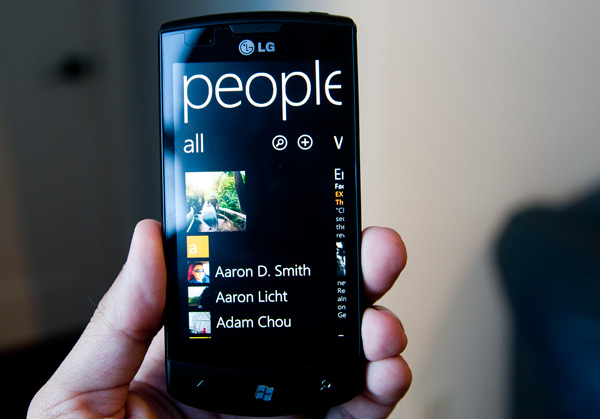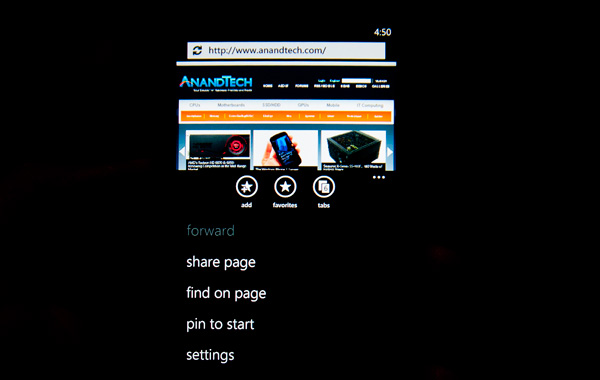LG's Optimus 7 & Samsung's Focus Reviewed: A Tale of Two Windows Phones
by Anand Lal Shimpi on December 3, 2010 10:14 PM EST- Posted in
- Smartphones
- Samsung
- Windows Phone 7
- LG Optimus
- LG
- Samsung Focus
- Mobile
The Screen, oh the Screen
With Android I found that larger screen devices made up for the shortcomings in the default Android keyboard. It's a big part of why I liked phones like the EVO and Droid X. Smaller handsets like the Nexus One were just harder to type on.
With Windows Phones, the exact opposite is true. The larger the phone, the harder it is to type fast on - at least for me. I make more mistakes on the Focus' 4-inch screen compared to the Optimus 7's 3.8-inch screen. I can type well on both, I'm just faster on the Optimus. If you have larger hands than me I can see the Focus being perfect.
Screen size is obviously just one part of the equation. While I believe LG wins there, Samsung easily takes the quality crown. The Focus uses the same Super AMOLED technology we talked about in the Epic 4G and Fascinate reviews. Super AMOLED layers the touch sensor directly on the AMOLED display, reducing glare significantly and moving the display closer to the face of the smartphone. You don't really notice the latter until you compare it with a standard AMOLED or LCD screen like LG's, but once you do it's a big difference.


The biggest advantage the Focus has is in contrast ratio. AMOLED displays are truly off when displaying black, so you technically get infinite contrast ratio. Combined with Windows Phone 7's vibrant theme colors you get a phone that's extremely eye catching. While you don't get the pixel density of the iPhone 4, the display is arguably better to look at in my opinion thanks to the contrast ratio. Everything just pops.
Even visibility outdoors is improved thanks to the close layering of the touch sensor and AMOLED panel. Unfortunately the Focus doesn't get very bright so you have to keep the phone at full brightness for it to be useful in the sun.

LG on the other hand falls short in the display department. The TN panel used in the Optimus 7 feels dated by comparison. Colors aren't vibrant, the contrast ratio is sub par and viewing angles are terrible. If you're not looking directly at the phone blacks will appear grey and at extreme angles there's a lot of color shift. Usually when you're using your phone you are staring directly at it, but the poor LCD quality is noticeable if you've got the LG on your desk for example.

Samsung Focus (left) vs. LG Optimus 7 (right), note the poor viewing angle of the Optimus
I have no complaints about the Optimus 7's build quality or screen size, in fact in those two areas LG is ahead of the pack, but the LCD is a disappointment.












34 Comments
View All Comments
sprockkets - Saturday, December 4, 2010 - link
Or maybe you can comprehend that light that is picked up from an LCD in their measurements is the LCD trying to mask the BACKLIGHT and why they can never be as black as an OLED screen?popej_ - Saturday, December 4, 2010 - link
Do you know what is transflective LCD? That kind of screen can be perfectly visible in full sunlight without any backlight at all. You can get the same useless black measurement as for AMOLED :)strikeback03 - Monday, December 6, 2010 - link
My understanding was that transflective screens generally are worse on battery due to the need to power the backlight through the additional transflective layer. For a phone that was going to be used extensively outside it might be worth it, for a lot it wouldn't.Also I don't think most users are confusing reflections on a glossy screen with bad black levels.
banvetor - Saturday, December 4, 2010 - link
Hi Anand, thanks for the great review, as always. These 2 phones are exactly the ones I was setting my eyes on, and I feel I'm leaning towards Optimus 7 (since I live in Italy).Anyway, I posted this on Brian's HTC Surround review, but I figure I should ask the same to you also... could you give some details on the usability of each mobile OS when you DO NOT have a data plan?
I currently don't own a data plan, and actually don't plan on owning one... my main uses for my smartphone are music, taking photos, and some more occasional web browsing and e-mail checking when there is wi-fi or when I really need to (in which case I pay for the KB of data).
My main issue when switching from my current Nokia N96 to WP7 (I think I sit exactly with the people you mentioned on the first page, not really sold on Android and not wanting to jump into the Apple ecosystem) is how dependent this modern mobile OSes are on a always-on data connection. For instance, I'm guessing that Zune Pass will not be so useful to me, but maybe you can store some songs on the phone to listen to while offline... On Nokia even the maps are offline stored, but I guess this is too much to ask to these new OSes ;)
Anyway, it would be great if you could post some of your findings about this on your next reviews...
Many thanks!
Leo.
tipoo - Saturday, December 4, 2010 - link
I'm surprised that even the BB Torch and the Dell Streak running 1.6 beat these phones on the benchmark page, despite their faster hardware. Since this is a new product for Microsoft I won't rag on them for this, but it does look like some browser performance optimization is needed.JimmiG - Saturday, December 4, 2010 - link
The poor battery life of the Focus makes it very hard for me to recommend it to anyone. I know how frustrating it can be, since I have an HTC Desire, probably comparable to the Nexus One... Not being able to use the phone for what you want because you need to take a call in the afternoon and need to make sure there's some battery left, or having the phone die on you after 3/4ths of the commute home in the afternoon...that can be very annoying.. and the Focus is even worse. If I were buying a WP7 phone right now, I'd go with the LG for the battery life.Enrox - Saturday, December 4, 2010 - link
3 are the apps preinstalled but there are 7 more available in the dedicated LG app store in the markatplace.ltcommanderdata - Saturday, December 4, 2010 - link
I'm just curious whether your performance benchmarks for Apple's devices have been updated to use the latest iOS 4.2.1? I was interested in seeing if iOS 4.2.1 improves performance and/or battery life compared to iOS 4.1. iOS 4.1 used a Safari based on Safari 4's WebKit while iOS 4.2.1 comes with Safari 5 so it should offer much improved JavaScript performance. It would be useful if you included the iOS version number in brackets for your charts as you do for Android phones.VashHT - Saturday, December 4, 2010 - link
I was wondering what brightness levels you guys used for the browsing test. On the focus I found that the low brightness level was a lot brighter than low on the HD7 and very usable for daily use (unless you're in the sun). I'd be interested to see how the the brightness level affects the battery life of the focus.Esteban2 - Saturday, December 4, 2010 - link
Anand, nice job with review. I think it is one of the best I've seen and I've seen just about every one.I think you left out one important missing feature--Visual Voicemail. I was about to buy a Samsung Focus (who cares about cut and paste??) when I realized there was no Visual Voicemail. Honestly after almost 3 years with an iPhone I had forgotten about voicemail was like but this brought back the horrors very quickly. Another important missing feature--a favorites list. When you want to make a phone to someone you frequently call you don't want to go to contact list and all the mess of facebook postings, etc that you're forced to with WP7.
Anyway, I'm hanging on to my iPhone 3G for now and waiting to see when Microsoft updates and brings Visual voicemail. Honestly, I can't understand why this feature is missing it seems so basic but I actually like the OS so will keep watching and waiting for now. If not there in 6 months I may have to bite the bullet and go with iPhone 4.